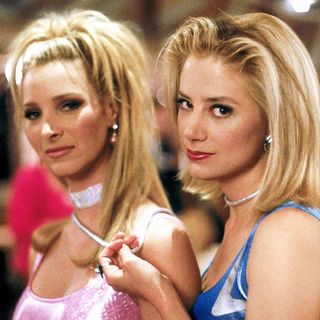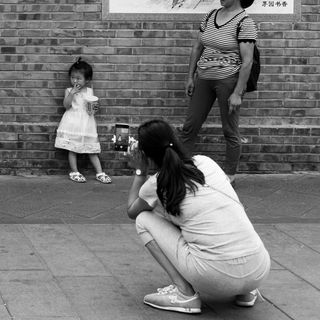
As Aziz Ansari Starts His Comeback, Why Are We So Eager to Forgive Him?
The Swaddle Team discusses coercion, likeability and the low bar for apologies.

During a Monday night show on his comeback tour, comedian Aziz Ansari responded publicly to allegations of sexual misconduct made a year ago. And while some people are torn about whether his deliberations about the incident were genuine or not, it’s certain that the bar for men to ask for forgiveness is pretty low (see: Louis CK). So today we parse through the murkiness of the Ansari incident, his response, and why we feel compelled to forgive him.
NN: Aziz Ansari said he thought a lot about what happened and he hoped he had become a better person. And I really want to believe that. I want to believe that so badly that I think I need to question why that is. Why are we so ready forgive Ansari?
Sure, in the grand scheme of the #MeToo movement, what he did — repeatedly, physically offering sex even after the person has said no — might seem less ‘bad’ compared to a Weinstein, but that’s really a false equivalency. Arguments about fatigue over #MeToo allegations aside, what Ansari did was bad. It was. There’s no getting around it. So why does his acknowledgement that he “just felt terrible this person felt this way,” feel like we’re now supposed to forgive him? This apology (though of course, he never says he’s sorry) came after an entire year of not addressing it, and he mostly just amplifies his own feelings (I.e., “it’s a terrifying thing to talk about,” or “There were times I felt really upset and humiliated and embarrassed.”).
Here’s the interesting part: In his set — a warm-up for a larger, international tour — he talks about the fall-out from ‘woke’ culture, how it’s gone too far, and how there are double standards for who we ‘cancel’ (R Kelly) and who we won’t (Michael Jackson). He literally name checks them in his routine, asking the audience if they’ve muted R Kelly, then asking again, if the latest documentary on MJ and child abuse at Sundance this year would make them mute him. Of course, less of the audience said yes. Ansari then asked if, rather than two kids, if 1,000 kids had made allegations — would the audience mute MJ then?
The point, it seems, is that the ‘bad’ that people do is forgiven or ignored, based on a whole number of other factors apart from what the person did. That we’re not objective or fair in how we treat people (or boycott them) but rather that it depends on how the deed is packaged, who the person is, their cultural cachet. And although Ansari’s set comes off as a slightly bitter reaction to a culture that (somewhat) called him out, this argument actually works in his favour. Ansari is likeable; he built his brand on feminism; he brought us Lena Waithe; he is one of the few brown mainstream actors out there, and the characters he’s played are difficult to distinguish from his own personality — in Parks and Recreation, Tom Haverford is a creepy dude, but he’s also slightly pitiable and very loveable.
This is not to brush off his non-apology and acknowledgement that something regrettable did take place between him and another person, but to think about why it is that Tom/Aziz is so very likeable, almost to a point where you do want to forget about all this bad stuff.
LG: N, you make some interesting points. I have a slightly different take on the Ansari incident. I agree that his behavior was bad, and am glad it has prompted discussion about toxic masculinity and its presumptuous privilege toward sex – that does need to change – and the way men and women navigate sex. I disagree that it is equally coercive as, say, the Weinstein abuse. Offering, even repeatedly, is not the same as forcing, and these nuances matter; otherwise there’s no room for discussion or evolution as society.
I’d also point out that Ansari has apologized – he apologized immediately, privately. When Grace contacted him the next day, Ansari reportedly texted back, “I’m so sorry to hear this. All I can say is, it would never be my intention to make you or anyone feel the way you described. Clearly, I misread things in the moment and I’m truly sorry.” He hasn’t ever issued a public apology, but frankly, as a member of the public, I don’t want one. He violated no laws, unlike most other #MeToo accused. He did not coerce. His apology should go to her, not to me.
Related on The Swaddle:
Is the Gillette “The Best Men Can Be” Ad a Good or Bad Thing?
What I do want from him is reflection. He could be a leader in this area, actively moving society to rethink interactions between men and women, but the snippets of what’s been reported of his pop-up set feel light weight. From Vulture: “’But you know, after a year, how I feel about it is, I hope it was a step forward. It made me think about a lot, and I hope I’ve become a better person.’ Ansari recalled a conversation in which a friend told him it made him rethink every date he’s been on: ‘If that has made not just me but other guys think about this, and just be more thoughtful and aware and willing to go that extra mile, and make sure someone else is comfortable in that moment, that’s a good thing.’” I wish he’d shared more of that “a lot” of thinking, more ways in which he and his friend have rethought every date. Perhaps he thinks his show is doing that? I don’t know; I don’t watch it.
Your point around who we forgive and don’t forgive and the significance of likeability is super valid. Ansari does definitely benefit from all of the things you say he benefits from. I’m not sure how to get around that, though. Is it possible, or even beneficial, to view an act in isolation of the person’s traits and patterns of behavior? Surely to do so would risk becoming rather black and white in our judgments, which again, would limit the space for discussion? At the same time, I acknowledge the danger of not doing so; what happens to, for example, the three, four, five women who’ve been sexually harassed at work, while their employer is waiting to see evidence of a pattern of behavior in a likeable or high-performing man before taking action?
NN: It’s so strange that people have different takes on what Ansari actually did. To me it was flat out coercion, where he continued to pressure her to engage in sexual acts even after she said no, both verbally and non-verbally. Yes, our culture normalizes this kind of ‘pursuit’ as an acceptable way for men and women to interact, where romantic situations involve men pushing women until they finally give in. But what Ansari did feels like it crossed this line — to say that “offering, even repeatedly is not the same as forcing” is to perhaps simplify what happened between them.
In that specific incident, Ansari wasn’t just offering — if we go back to the breakdown of that night, she “stopped moving [her] lips and turned cold” to show that she was uncomfortable with what was happening, and when he didn’t get the message, she told him “I don’t want to feel forced because then I’ll hate you, and I’d rather not hate you.” He told her he understood, but then continued to coerce her and touch her in a way that showed that he definitely didn’t understand or, more probably, didn’t care.
Related on The Swaddle:
Does It Hurt More When A Woke Feminist Bro Turns Out To Be A Predator?
Putting aside questions about the thoroughness of the Babe.net reporter who broke this story, the fact is that this woman felt violated — and so, so very many other women identified with both her and the situation. The discussion around this issue does not have to be reduced to a black-and-white judgment, in terms of how we cope and come back from #Metoo, and of course there should be space for people to grow and learn and pull out the intricacies of how our culture has allowed and normalized certain behaviors. But what Ansari actually did, the act itself — that’s not a grey area.
We’d all “rather not hate” Ansari. We really do want to think of him as a guy who is on our side — that side being one of decent men, who call themselves feminists, who call out misogyny, and talk about sexism as a problem that everyone should take ownership of. The hypocrisy, then, of him behaving like this, almost makes it worse; Ansari cannot feign innocence about how society has normalized this kind of behavior — he literally talks about how we must push back against this all the time. Until now, of course. Now his set is about the danger of ‘extreme wokeness’ as the New Yorker puts it. Now that he’s actually been called out himself, there must be something wrong with call-out culture, and not with him. To me, this is way more telling than his apology is.
LG: Fair enough. Perhaps I should reframe my first statement then: This incident, with these people, was coercive (if not criminally so, as in the cases of Weinstein). What’s fascinating about this, though, is that I know so many women, myself included, who have been in essentially the exact same situation, but who would not say they felt coerced — as well as so many women, like you note, who say they recognize themselves in the coercive version of this interaction, too. There are likely so many reasons for this difference — age, privilege, lack of celebrity, personality. And on the man’s side, of course, the massive male privilege that colors interpretation of interactions and events in his favor.
And that’s where I’m most disappointed in Ansari, and where I think we align: No matter how likeable he is, he doesn’t get a pass on missing the opportunity to lead the discussion around these differences in experience and perception — and how men should be more aware that their interpretation of signals, events and above all their own behavior, isn’t the definitive version. He should be leading the discussion around how we communicate, navigate and disregard (often simultaneously willfully and unintentionally) sexual comfort, especially women’s sexual comfort.
A guy who has made his name discussing ‘Modern Romance’ actually has the chance to discuss it, in all of its thorniness, and change the paradigm, change the way we communicate and think and care about and have sex with each other. I hope he’s become a better person, too. But I’d be happier if he talked about how he has, so that other men can become better, too. Instead, all he offers is ‘I’ve thought a lot.’ Dude, that’s not the point — what you’ve thought is the point. And if you can’t articulate your thoughts more profoundly than that at this point, you probably haven’t had the most considered or progressive thoughts.
Related on The Swaddle:
The #MeToo Men Need a Course in Public Apology
RD: In both of the apologies that Aziz Ansari has issued — the first in a text to Grace after the incident, and the second one in his stand up set a year later, he doesn’t admit to any wrongdoing. Both seem like damage control, an attempt to allay his critics so he can continue to be this loveable brown comic everybody seems eager to forgive.
The morning after, when Grace made known her experience to him via text, he responded, “I’m so sad to hear this. All I can say is, it would never be my intention to make you or anyone feel the way you described. Clearly, I misread things in the moment and I’m truly sorry.”
Looking at the number of times Ansari has spoken out against sexual harassment and assault and embodied a generally feminist vibe, I find it hard to believe that he didn’t know exactly what he was doing and how grossly harassing it could be perceived as. I think he just couldn’t be bothered to make sure Grace felt comfortable in his company, and that he consciously prioritized his own sexual gratification over her comfort. In this text apology, I don’t think Ansari takes enough responsibility for his actions, which he then knew had a negative impact on Grace. He tries to exonerate himself by saying it wasn’t his intention to make her feel the way she did, which I perceive as his attempt to consciously play dumb, and shift the responsibility of Grace’s feelings back to her, without having to acknowledge the ways in which he stripped her of her agency the night before. His tone in the apology, to me, implies a certain dismissal of Grace’s feelings, which I think he has repeated a year later.
In his stand up routine, Ansari said that he felt embarrassed, humiliated and upset. He said that he felt terrible that Grace felt a certain way. Again, he shies away from accepting any responsibility for Grace’s feelings, making it seem like Grace was in over her head and the nice guy that Ansari is, he’ll deign to apologize anyway. For me, these apologies are completely devoid of any sincerity whatsoever.
Related


Feminist TV Soaps Are Finally Finding a Foothold With Mass Audience
